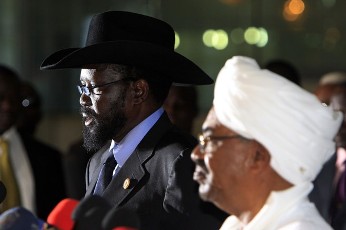South Sudan’s Kiir ends Khartoum’s visit, vows with Bashir to defeat “enemies of peace”
October 9, 2011 (KHARTOUM) – South Sudan’s president Salva Kiir Mayardit on Sunday concluded his visit to the Sudanese capital Khartoum and held a press conference with his counterpart Omer Al-Bashir, with both pledging peaceful dialogue and no return to war.

“We are committed to initiate dialogue and reach solutions regarding issues of peace, the situation of Abyei as well as security and economic aspects,” Kiir said, as quoted by Sudan’s official news agency (SUNA)
He further said that they are committed to guarantee that none of these issues would take north and south Sudan back to twar, adding that the prosperity of both nations lies in peaceful dialogue which would enable them to defeat “enemies of peace” on both sides.
Kiir’s visit to Khartoum, which started on Saturday, was his first since the south gained independence in line with the outcome of a vote that was promised under the 2005’s Comprehensive Peace Agreement which ended more than two decades of Sudan’s north-south civil wars.
The two countries, however, remain deadlocked over a number of issues including the status of the border region of Abyei, which is claimed by both, and the fees Juba should pay to Khartoum for the use of its pipelines infrastructure and refineries to export southern oil.
Addressing the press conference, Al-Bashir noted that Sudan and South Sudan had formed joint committees and given them deadlines to reach final solutions to the pending issues. He further said he expects the said committees to conclude their work in a brief period and sign a final agreement to resolve all issues in security, military, political, economic and social aspects.
The Sudanese president further stressed that achieving security and stability between the two countries was deeply rooted in the commitment of both countries to refrain from interfering in the internal affairs of each other.
He further called for establishing “soft borders” between the two countries in order to allow movement of traders and citizens.
Tension between Sudan and South Sudan escalated following the eruption of clashes between Sudan’s army and former comrades of the south’s ruling Sudan People’s Liberation Movement (SPLM) in the north’s border states of South Kordofan and Blue Nile.
Khartoum accuses the south of supporting the rebellion of the Sudan People’s Liberation Movement North (SPLM-N) in the two states, a charge Juba repeatedly denied.
The two sides also remain at loggerheads over Abyei region, with Khartoum saying it will not withdraw its troops from the region it occupied in May this year region unless a UN-mandated mission of Ethiopian peacekeepers –agreed between the two countries in June – is fully deployed.
On the positive side, the two countries signed an agreement last month to jointly monitor shared borders and open ten crossings to allow movement.
Meanwhile, a press release by Sudan, published on the website of SUNA, said that the two countries had agreed to establish a committee for political dialogue between their ministries of foreign affairs.
The release also said an agreement had been reached to prevent any hostile action and instruct security units in both countries to verify current accusations and halt them immediately.
According to the release, the two countries also agreed to revitalize their joint committees under the aegis of the African Union High-Level Implementation Panel (AUHIP) to resume discussions over financial and economic issues, including oil.
It also said that if the AUHIP-moderated talks failed to achieve progress, the two sides should engage each other directly and without a mediator.
Earlier this month, few days ahead of Kiir’s visit, Al-Bashir said Sudan was committed to dialogue with the south but without foreign mediation.
“With regards to Abyei area” the press release added “an agreement was reached to form a joint mechanism for humanitarian operations and the two sides agreed to complete the implementation of the agreement on “temporary arrangements for the administration and security of the Abyei Area.”
The two sides also agreed that disagreements over border areas would be discussed at the level of presidency.
(ST)
